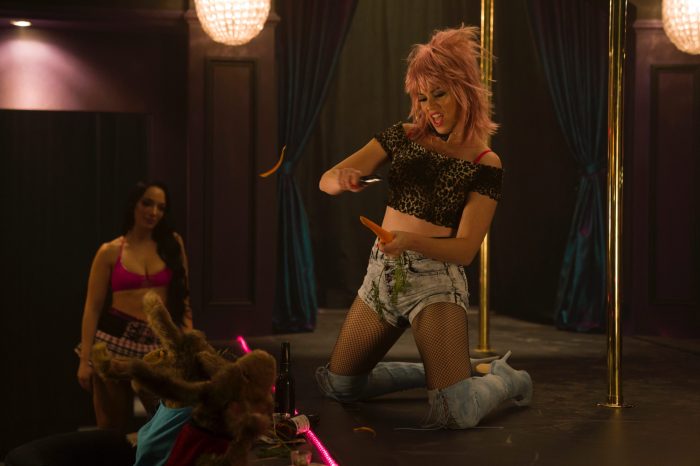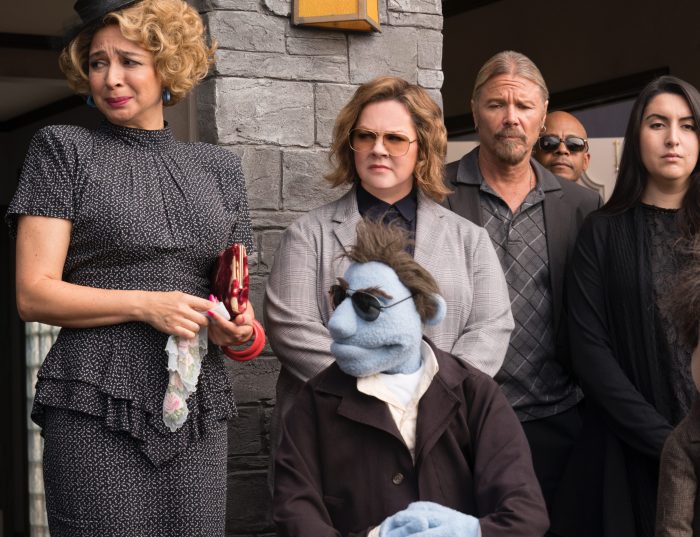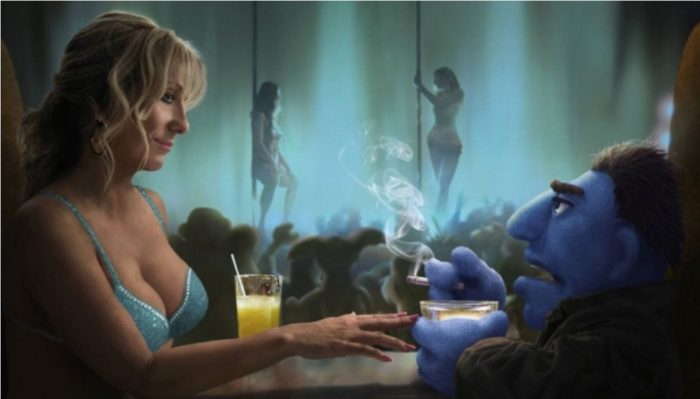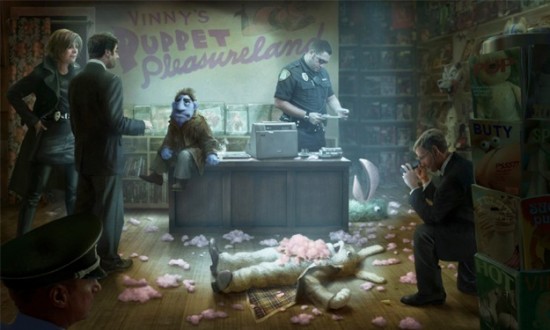'The Happytime Murders' Producer Ben Falcone Describes The Difficulties Of A Puppet Movie Set [Set Visit Interview]
For our third and final interview from our visit to the set of The Happytime Murders, I bring you a discussion with producer/co-writer and Melissa McCarthy's close collaborator Ben Falcone. In a roundtable interview, Falcone talked about how good the screenplay was on first read, the strange world-building of the movie, the difficulties in making an R-rated puppet comedy, making raunchy comedy that isn't mean-spirited, how inactive puppets look like they've died, and how a puppet set is different from a regular set.
Do you do any puppets in this movie? What's your role beyond producer?
That's it. I'm just back there trying to pitch jokes, but mostly yeah. Thank you so much. But yeah, no, that's, that's all I, that's all I'm doing here.
What made you and Melissa want to this?
You know, Melissa read the script and she read it really quickly and said she thought it was great. Which, you know, there are, there are good scripts out there... This one's really great, not all that common. So, um, I read it and I also thought it was really great. And so basically it just comes. I read it, I mean, I'm sure I'm exaggerating, but I feel like I read it in 30 minutes. It was just a really clean and really funny and I thought it had a good point, some good points to make. So I was into it from the, from the start.
Could you give us a synopsis of the movie kind of where we start without too far into it?
Sure. Like 25 minutes later, I'm like, and in summation! It's a movie about, it's a world in which, you know, puppets and humans lived together and puppets are sort of the outcasts of society a little bit. There's a puppet cop named Phil played by Bill Barretta who's amazing and a human cop, a detective Edwards played by Melissa and they've had a falling out and they have to re-team up to solve a series of murders. So that's basically what it is with the, you know, the sort of puppet human societal element in the background.
As the murders are happening? Apparently there was a show that happened in the 1980s?
Right. So, The Happytime Murders refers to a show called The Happytime Gang, which is like a famous show from the eighties or early nineties where, yeah, where there are puppets and a human, Jenny, played by Elizabeth Banks, our friend. Then she was the star of the show. And so basically Phil gets wise to the fact that these murders are going down and brings Edwards in even though they have a lot of animosity towards each other and they, you know, it's, it's kind of a, it's a, a cop movie. A buddy movie and it's, you know, to me it's about their friendship and about them, like kind of reconnecting through some hard stuff and you know, during some hard times, and it's super fun because puppets are very funny.
 You said the puppets are sort of outcasts. Did something happen to make that?
You said the puppets are sort of outcasts. Did something happen to make that?
You know, it's, I think it's just the world that's set up that Brian is setting up really well. Brian Henson and the director and it's, it's just like, that's how the world is. There's just a, there's puppets, you know? So, when you see a walks sign, there's a human one and then there's a puppet one at their level because generally they're a little bit smaller. You know, the way that he's got it set up is that puppets are sort of ostracized and they're a little bit less than and they're not taken care of entirely by the law. And so, it's a really interesting kind of world that he's just setting up and he's just saying this is how it is.
Is there a message in there?
Well, I mean, I think you could definitely find some messages in there of like, you know, trying to treat everybody with equality and you know, a better, a better country for all of us for sure. Yeah.
I always loved when Henson would do these more adult things, but it seems like it's harder and harder to do puppet stuff that is adult. How hard is it to get a production like this off the ground?
Well, they've had it going for, I mean, I'll let Brian speak to it, for many reasons. First of which, he's smarter than me, but he's, I think had the script for six years and Adam Fogelson from STX has loved it forever. And when you've got the head of a studio and Brian Henson and it still takes a long time, it must mean that it's pretty tricky to get it going. But here we are. They were crazy enough to let us try it. So, it seems really funny and Brian's making a great movie.
 Where would you rank the R-ratedness of this versus the movies we're more familiar with?
Where would you rank the R-ratedness of this versus the movies we're more familiar with?
Oh, you know, I'm a prude by nature actually. I would say this one's, you know, it's a hard R I guess, but it's also a super fun R. So like I, you know, when things get super mean-spirited or that kind of thing, I generally tune out as a viewer and I think this movie's got great heart, you know, reflected through the script and Melissa's performance and Bill's performance. And certainly Brian is just a sweetheart of a guy and I think, I think you'll feel even when you're like, 'Whoa, did I just watch that?' Um, hopefully I think that good heart's going to come through.
You mentioned earlier about punching up Jake. So I'm presuming it knowing, producing that you might be helping with some of the writing as well?
Well, just on set, you know, Melissa did a rewrite of the script and you know, I live in the same house as her so she'll say, 'What about this?' And I'll say, 'Sure!' but she's doing all the work. I'm sort of like just, you know, drinking coffee, walking around, playing with the dogs. And she's like, 'what about this?' And I go, 'well it seemed good. Bye!' So as in terms of like I on-set writing, I try to help with basically in terms of like does it, we feel like this moment's working? And you know, since Melissa has done a revision and Brian's lived with the script for so long, like we feel a certain sense of latitude of something. Once you get into a space, sometimes things aren't quite what you thought they might be or I just try to help, you know? Make things efficient and funny. Basically, what I think, I think my job is, though I'm not exactly sure what my job is.
Aside from Phil are there any puppets that you have an affinity for?
So far, all of them there. I mean really to get in touch with these, you know, you guys saw that room. It's like to get in touch with these puppets and to see them in a more adult setting. You know, these are the puppets I grew up with. The puppets, like these puppets. Um, and to see them in a more adult setting has been kind of amazing. But you know, the ones so far that particularly speak to me. I mean Sandra's kind of an amazing puppet. She's sort of the femme fatale and you know, this tall and she's pretty and sexy and it's just like, this is not the thing that really happens is when, when they're, you know, the frame is there and when they start to speak, and Vinny is one of my favorite puppets, but when they are talking and you know, eventually the puppeteers' arms get tired because they're literally like this and they're jam behind a cupboard or something. And so when the take ends, you literally see this character that you've been listening to and like caring about and they go, 'oh,' and it looks like they died. And I'm always like, 'oh shit is everybody all right?' I start to freak out. Goofer is an amazing puppet. There are some really amazing puppets that you care about. And again, there are some murders that happen. So you do, it can be a little disturbing.
 How much of the actual murders do we see?
How much of the actual murders do we see?
You know, there's some violence depicted in this R-rated film and yet, you know, there's some, you know, after, you know, the aftermath of a crime scene for sure. So there's some pretty, uh...but they're filled with fluff, not blood. So it's lots of fluff. Yeah.
Even though there are humans behind the puppet, does it seem unique and different experience knowing that half the cast is made of fur?
Yes. It's absolutely. I mean, you know, you and you've got, you know, if you have a really busy scene... I've never done anything like this. You know, there's a lot more technical. It's technical when you have puppets. They're like, we're on a raised set right now. Like we just all get on stairs and we're like, oh, we're just, I don't know, here's where we're doing this, you know, but when we're doing a scene, they, all these pieces of floor come up. So there are literally, you know, there could be 20 people in the floor and you just start to kind of forget about it and think it's normal. The short answer is it's been very different for me for sure. I've directed a, you know, three movies, but I've never seen anything like this for sure,
What's the hardest thing to pull off?
We're doing a lot of action and puppets don't generally have working legs. So that would be a trick or like, you know, like she swings the suitcase and bashes so and so in the face and you're like, 'well that puppet is on a rod.' So it can't just, if it's a person you're like, 'okay, let's set up for the stunt, which has already got a little tricky, you know, you've got like three or four shots and you're trying to figure it out and make it look exciting and neat. And this one, you know, you're like, 'okay, well, she doesn't have a hand in this size. We can't do it in there.' Brian, Brian Henson. And sometimes you just see him and he's like looking up into the sky, like searching for an answer. And he's the most experienced person we could possibly have. And he's like trying to literally on the fly, figure it out because no one's done it before.
 Was there any research before this all started in terms of movies that have had puppets in them?
Was there any research before this all started in terms of movies that have had puppets in them?
You know, I didn't do a ton of that research because Brian Henson was involved with all of them. So I would have been like, 'Hey, do you know what I learned about the dark crystal?' He goes, 'You mean that movie that we did back in whenever?' I'd be like, 'yeah, I researched it and I found out.' No. So I, I'm blissfully on that regard. I just threw myself into trying to learn more so I can be more helpful to Brian because he literally is like maybe the world's biggest expert on puppetry. Right? In terms of like how to do it and ways to do it.
And what's been interesting is Melissa and my ignorance of it, we hope in some ways can be helpful because what we do is we come in and we say, 'well, why can't you can get with a puppet? Isn't there a way to do it?' Just like. And then like sometimes we, like, we just, we say it and we walk away real quick, like 'maybe he'll come up with something!' Half the time he sort of does, which is kind of great. So we'll just be like, 'well, why couldn't!?" You know, there's a million reasons, you know, again, the floors have to come out, someone's underneath the floor articulating a puppet. And we're like, 'well why can't he just run over there and come back and run over there and come back and climb up the wall!?' And then later they'll be like, 'you know what? We figured out a way we could try it. I'm like, great. Yeah.
